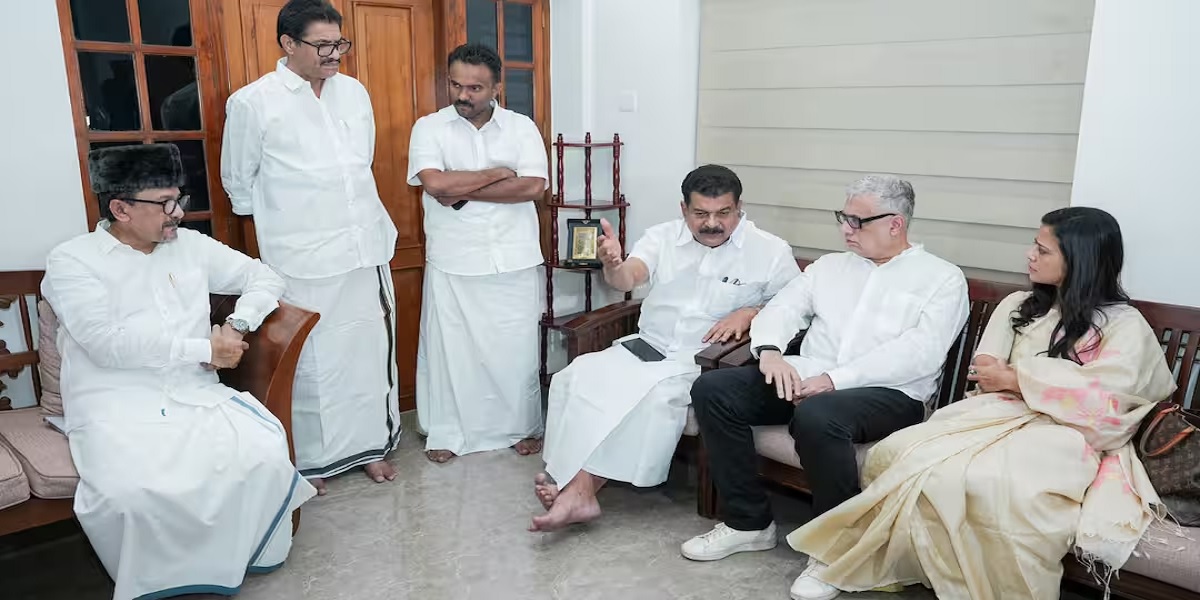Behind the News is your round-up of musings from the corridors of power. Read what goes on behind the scenes for news & newsmakers.
Published Nov 21, 2025 | 12:31 PM ⚊ Updated Nov 21, 2025 | 12:31 PM

TMC MPs Mahua Moitra and Derek O'Brien, accompanied by P.V Anvar, met Sadiq Ali Shihab Thangal in Malappuram. (File photo)
In a remarkable turn of events, Trinamool Congress leader PV Anvar has now thrown his full weight behind the UDF in the local body elections. He has instructed his followers to avoid contesting against UDF candidates anywhere and not to use the party symbol in any seat where the UDF is contesting.
According to Anvar, ensuring a UDF victory is crucial to end ‘Pinarayism’ and he has directed the party cadre to align accordingly.
Trinamool sources say Anvar is steadily moving toward local-level seat-sharing deals with the UDF, with discussions in progress. After talks with UDF leadership, he clarified that TMC will field candidates only in wards allocated to them. This cooperative shift comes even as broader discussions on Trinamool’s potential entry into the UDF ahead of the Assembly elections have gained momentum.
Opposition Leader VD Satheesan and the Indian Union Muslim League are reportedly favourabe to this arrangement.
State chief coordinator VS Manojkumar reinforced the new direction, stating that TMC will not oppose the UDF in any ward during the polls. In Malappuram’s Karulai panchayat, for instance, the UDF–TMC alliance will jointly contest, with Trinamool candidates in wards 10 and 14.
The contrast with the party’s position just a month ago could not be sharper. At that time, the TMC Kerala unit had boldly announced plans to contest on its own in nearly 20,000 wards, asserting that the party needed no alliances.
Today, that confidence appears to have melted into a far more flexible strategy, one that even many TMC leaders privately claim they were never informed about.
When South First contacted senior TMC leader Shamsudheen P, he offered a reminder that the party has a longer history in Kerala than many assume.
”TMC was officially launched here in 2009. I’ve been part of it from the beginning, because we believe Mamata Banerjee’s ideology has relevance in Kerala, it speaks for marginalised communities” he said. He recalled the party contesting five Lok Sabha seats in 2014, including major constituencies like Idukki and Thrissur.
The TMC also had a brief golden phase when MLA Jose Kuttiani joined from the Congress, only to later return to his former party.
Funding remains a major obstacle, Shamsudheen added. During the last Lok Sabha elections, candidates received just ₹5 lakh each from Mamata for campaign work.
”Other parties still mock us as a ‘Bengal party.’ They forget the role of regional parties in Indian politics. In states like Tamil Nadu and West Bengal, these so-called regional parties run governments” he said.
He noted that in February 2025, senior leaders like Derek O’Brien and Mahua Moitra had visited Kerala to launch a membership drive and revive organisational activity.
”We will return strongly” he insisted.
Yet, despite these optimistic words, many within the party admit—off the record—that they have no clarity on the evolving strategy for the local polls.
Some leaders say they were completely in the dark about the sudden shift toward an alliance with the UDF, as if they belonged to an entirely different organisation.
Amid this confusion, what is clear is that Anvar is manoeuvring for a prominent role within the UDF, while the IUML is working to ease tensions between him and the Congress. The hope, according to party insiders, is that this recalibration will ultimately facilitate a meaningful TMC comeback in Kerala.
For now, though, the party’s Kerala strategy appears so secretive that even those wearing the TMC badge seem unsure whether they’re supposed to defend it, follow it or simply wait for the next unexpected twist.
